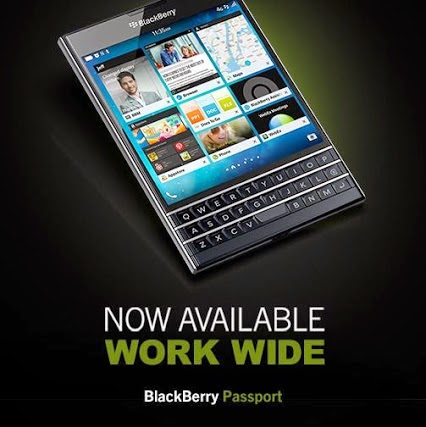PASSPORT NOT QUITE THE TICKET TO BLACKBERRY
REVIVAL...
××××××××××××××××
There is much to like about Black-Berrys .
Their squat design , in particular , and tippity-tap keyboards
are models of efficiency and lend an air of businesslike legitimacy .
For those who remain steadfast in their support of BlackBerry , this is the
season for you..
Later this year , the company will release the BlackBerry Classic,
an updated smart-phone that will feature the traditional keyboard ,
trackpad and physical navigation keys of earlier
Bl/Berrys . But the Bb company hopes its premium-priced
smartphone recently released , will also find new converts to the brand
.
And the Passport makes a strong case - but not quite strong enough . That's
especially true since it's likely to be expensive even with a new contract . The
phone is $ 600 with no carrier subsidies .
The Passport has a good story .
It's the size and shape of an actual passport , which BlackBerry calls "
the international symbol of mobility ."
The design is startling and polarizing .
Its screen is a near-perfect square and three lines of , yes ,
physical keys grace the bottom of the phone .
We like its crisp lines and aggressive , vaguely 1980 styling , with mate
black plastic , exposed stainless steel frame and sturdy
heft . Its wide body makes it easy and confortable to hold in two hands
while typing .
But the awkward size has drawbacks .
You can't easily place it in a car's cup holder , so if the phone is your
navigation companion , it's hard to figure out where to put
it . It"ll fit in a back pocket , the front pocket of a loose-fitting pant
, or a suit jacket ,but not in the phone pockets sewn into most purses .
As for one-handed use , just forget it...
As with BlackBerry phones of yore , the keyboard is the star
of the Passport . It gets some new tricks that pair with the
device's big , 4.5-inch LCD screen .
The physical keys are limited to letters , backspace , return and the space
bar . All other keys appear as a virtual keyboard on the screen . The physical
keyboard is touch-sensitive ; you can flick up on the keyboard to select an
autocomplete word , for example. You can also scroll up and down on the keyboard
, which evoques that beloved BlackBerry trackpad and keeps the
screen pleasingly smudge-free .
But using the actual keyboard isn't as easy as I remember .
The keys are stiff and take some work to press .
Even after several weeks of use , I felt slow . I typed more like a
hunt-and-peck newbie than the " power professional " BlBerry
says are its primary targets .
In a speed test , it took me 15.7 seconds to type " The quick
brown fox jumps over the lazy dog " on the physical keyboard although
auto-correct typed " The suck brown fox ."
The same phrase took 9.3 seconds on Android and 8.3 seconds on an iPhone 5s
and the sentence was accurately autocorrected
on both .
When I used the BlackBerry's swipe upward yrick to choose every word in the
sentence , the time was reduced to 8.8 seconds - still lower than the iPhone
even though the phone knew every word I was going to use .
As for the overall experience , the phone's operating system ,
the BlackBerry 10 , is complete and relatively familiar ;
it behaves similarly to Android and can run many Android apps .
To download apps , you use the BlackBerry World app store or the Amazon app
store , which is preloaded .
But not all Android apps are available : You can't get the suite of Google
apps available from the Google Play store , for example , the official Google
Maps app .
You can download Google-owned Waze from the Amazon app store , or a $6 app
that is said to be powered by Google Maps in the BlackBerry World store .
There are some good BlackBerry-only amenities , like its coming Blend
software , which will let you access text messages on your desktop computer or
even a tablet , like an iPad .
BlackBerry said Blend would operate as a secure sandbox for your work
communications , even on a personal device .
BlackBerry also promotes its BlackBerry Assistant , which is like Siri ,
Google Now or Windows Phone's Cortiana .
It does a good job of learning behavioral habits , so that when you tap the
share button on a photo , for example , it suggests the person you're most
likely to send it to .
We also found its speech recognition very good .
But BlackBerry Assistant needs multiple confirmations to execute commands .
If I say " call " a specific contact , for example , Google Now or Siri calls
that contact .
BlackBerry Assistant asks me if I really want to call . It's just one step
too many .
Thus was our experience throughout - small inefficiencies that slowed me
down . The cursor doesn't always appear in text fields when it should , the lack
of a " home " button is annoying ,
and we found performance - like swiping between apps and screen
responsiveness - a bit slow . Sometimes the touch screen just didn't respond
.
Ultimately , the BlackBerry Passport feels different , daring and
promising , but not enough to entice most people away from
better-known devices .
There will be definitely some who dare to be different and who choose brand
loyalty above all .
To them we say , you will love the BlackBerry Classic .
×××××××××××××××× ×××××××××××××××



